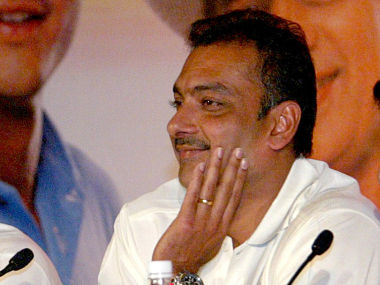I could sense it coming. It had begun looming over Wankhede stadium and my TV set as India’s ‘runs to win’ were competing thrillingly with West Indies’ ‘overs to go’ in yesterday’s test match. Commentator Arun Lal had even dropped its precursor line, “Whatever-happens-the-crowds-have-got-their-money’s-worth.” And then, it let me down. During the presentation ceremony, I could see that Ravi Shastri was getting severely constipated to say it but ultimately, he managed to stifle it. Yes, I’m talking about his notorious coinage, the phrase ‘In the end, cricket was the real winner.’ Ever since the first closely fought match that Shastri commentated on, he’s been conditioning us to believe that even if the winner is decided after a last-ball-boundary or even if a Ranji team beats Australia, these are only formal closures of a game that has already been won by ‘cricket’. Even though his concept is a nod to the spirit of the game and still finds some appreciators (most of them memory loss victims), it has largely remained as joke to most Indians, often a cruel one. [caption id=“attachment_141236” align=“alignleft” width=“380” caption=“Ravi Shastri has mastered the art of making cricket win no matter what. Reuters”]  [/caption] This is because we’re fine with cricket winning only if team India wins along with it. The moment a tight game finishes with a Venkatesh Prasad getting trapped leg before (v/s Zimbabwe, World Cup ’99) or an Andrew Strauss batting phenomenally to make England tie with us (earlier this year) or as in yesterday’s case, an Ashwin failing to run the extra winning mile, we’re outraged. The ‘cricket being the real winner’ line is met with the choicest cuss words, the most popular being the Hindi term for a large bell. The recently concluded series with West Indies, especially the last match, had enough of the above, the first being abysmal stadium attendance. If we’d have really believed in Shastri’s philosophy, the stands at Delhi’s Feroz Shah Kotla and Kolkata’s Eden wouldn’t have looked as sullen as Sharad Pawar’s face. Instead, the only ‘Occupy’ movement witnessed was at Mumbai’s Wankhede, and that too not on the final day (a Saturday) but a day earlier when Sir Sachin was touted to reach that milestone-that-cannot-be-mentioned. And not surprisingly, when he fell six runs short of that, the bowler who earned his scalp got generous amounts of the above mentioned abuses on finishing his over. In the end, the stand behind third man was the winner. Later, when the Windies captain Darren Sammy resorted to the ‘unnecessary stretching and prolonged chats with bowler to waste time’ strategy, the same crowd picked on him, instantly inventing an alliterative ‘Sammy sucks’ chant. It obviously didn’t sympathise with the fact that such tactics are the least any visiting captain of a young team would employ when facing a test series whitewash. However, it didn’t matter later as the match wound up as a rare ‘tied draw’. Or in other words, despite Sammy walking away smilingly in the end, neither team was the winner. I however came close to agreeing on the spectator’s stand on Sammy as he, in his post-match talk, dropped the mother of modern clichés (the father being the Shastri-ism we’re talking about) by saying this test was indeed ‘an advertisement for test cricket!’ These days, every time a test puts up five days of linear action and decent performances, it is quickly termed as ‘an advertisement for test cricket’ by all and sundry (even if the test has attracted only about one fifth the viewership of an average T20 game). Every Indian tour to Australia is an advertisement, the South Africa-Australia rivalry is one… and the Ashes are nowadays the ultimate, front-page, prime-time advertisements for test cricket. Clearly these advertisements weren’t being watched when the recent Aussie tour to South Africa (which featured just two tests, quite a shame) or the Test Championships (a Test World Cup, now unlikely till 2017) were being discussed. I only fear these advertisements aren’t ‘selling’ test cricket much and in the end, IPL is the real winner. All this said, we must face it that the creator of the said phrase is still fit as a tracer bullet and has planned well to ensure his commentary career is at least thrice as long as his playing career. Which means that every time a game’s result is decided in its last half hour, he might throw the phrase on our faces. Only when we applaud for a better team beating India, or digest that Sachin (or anyone) got out to a genuinely good delivery, or Arun Lal gives up commentary for good, or IPL gets banned for having corrupted the game, will his phrase make sense, and cricket will be the real winner.
Even though his concept is a nod to the spirit of the game and still finds some appreciators, it has largely remained as joke to most Indians, often a cruel one.
Advertisement
End of Article
Written by Malay Desai
Malay Desai is a feature writer with a penchant for travel, food and test cricket. But as none of those pay his credit card bills, he runs the content firm Punchlines.' see more


)

)
)
)
)
)
)
)
)



